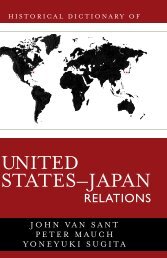Songs of the Righteous Spirit: âMen of High Purposeâ and Their ...
Songs of the Righteous Spirit: âMen of High Purposeâ and Their ...
Songs of the Righteous Spirit: âMen of High Purposeâ and Their ...
Create successful ePaper yourself
Turn your PDF publications into a flip-book with our unique Google optimized e-Paper software.
JAPANESE SONGS OF HIGH PURPOSE 127example, after he had tried <strong>and</strong> promptly ab<strong>and</strong>oned <strong>the</strong> idea <strong>of</strong> studyingnavigation, Takasugi Shinsaku found himself back in Hagi, workingat <strong>the</strong> domain school <strong>and</strong> casting about for a future course in life. Heimagined himself to be a man whose talents <strong>and</strong> sheer earnestness wentunderappreciated. In <strong>the</strong> following quatrain, he alludes to two contrastingresponses to such a predicament:繁 文 爲 累 古 猶 今今 古 誰 能 識 道 深采 菊 采 薇 眞 的 意人 間 萬 事 只 斯 心偶 成Extemporaneous compositionIn dense thickets <strong>of</strong> text piled up from ancienttimes to <strong>the</strong> present,Who now, or <strong>the</strong>n, has penetrated <strong>the</strong> depths <strong>of</strong><strong>the</strong> Way?Plucking chrysan<strong>the</strong>mums or fiddleheadferns—herein lies <strong>the</strong> true meaning;Many are <strong>the</strong> things in this world, but all thatmatters is this.40The references in <strong>the</strong> third line are to famed eremites <strong>of</strong> Chinese antiquity.The phrase “plucking chrysan<strong>the</strong>mums” alludes to <strong>the</strong> reclusivepoet Tao Yuanming (365–427), who resigned his post as <strong>the</strong> magistrate<strong>of</strong> Pengze in 405, during <strong>the</strong> final years <strong>of</strong> <strong>the</strong> Eastern Jin, <strong>and</strong> declinedfur<strong>the</strong>r <strong>of</strong>ficial service.41 The second reference in this line is to <strong>the</strong>bro<strong>the</strong>rs Bo Yi <strong>and</strong> Shu Qi, quasi-mythic figures <strong>of</strong> <strong>the</strong> remote past,who chose to starve <strong>the</strong>mselves ra<strong>the</strong>r than serve a regime <strong>the</strong>y believedcorrupt. When paired alongside Tao Yuanming’s positive embrace <strong>of</strong>reclusion, <strong>the</strong> bro<strong>the</strong>rs’ radical self-abnegation appears para digmatic<strong>of</strong> an alternative solution to <strong>the</strong> problem <strong>of</strong> remaining true to one’sprinciples: that <strong>of</strong> extreme self-sacrifice.42 Takasugi’s poem thus shows40Takasugi Shinsaku zenshū, ed. Hori Tetsusaburō 堀 哲 三 郎 , p. 388.41The reference is to a famous couplet in <strong>the</strong> fifth <strong>of</strong> Tao Yuanming’s series “Yin jiuershi shou” 飲 酒 二 十 首 : “Picking chrysan<strong>the</strong>mums by <strong>the</strong> eastern hedge / I catch sight<strong>of</strong> <strong>the</strong> distant sou<strong>the</strong>rn hills” 采 菊 東 籬 下 悠 然 見 南 山 ; see James Robert <strong>High</strong>tower,trans., The Poetry <strong>of</strong> T‘ao Ch‘ien (Oxford: Clarendon Press, 1970), p. 130.42Alan Berkowitz calls Bo Yi <strong>and</strong> Shu Qi “extreme exemplars” <strong>of</strong> a type he terms <strong>the</strong>“paragon <strong>of</strong> extraordinary conduct”: those who shun service because <strong>of</strong> <strong>the</strong>ir fundamentalnature. Such figures, argues Berkowitz, thus st<strong>and</strong> in contrast to Confucian heroes,who tend to make ad hoc evaluations <strong>of</strong> <strong>the</strong> propriety <strong>of</strong> service at a given juncture; see hisPatterns <strong>of</strong> Disengagement: The Practice <strong>and</strong> Portrayal <strong>of</strong> Reclusion in Early Medieval China(Stanford: Stanford University Press, 2000), pp. 39–44.













